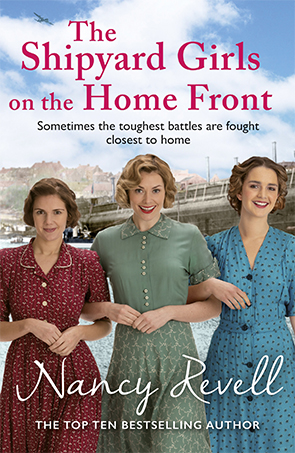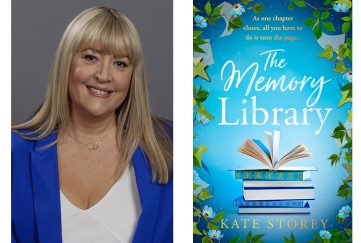The Shipyard Girls: Q&A With Nancy Revell

December, 1943. As the war effort gathers steam in Europe, it’s all hands on deck on the home front.
Gloria is over the moon to be reunited with her sweetheart Jack. But her sons Bobby and Gordon are away with the Navy, and still know nothing of their mother’s divorce and new half-sister.
Rosie’s squad of welders must work gruelling hours in the yard as they prepare for the Allied invasion of Normandy. All the while Rosie waits anxiously for news of her husband Peter, an undercover operative in France.
Meanwhile welder Dorothy has a feeling that her beau Toby is planning to pop the question when he’s next on leave. But it seems her head is being turned by someone closer to home…
It will take great strength and friendship if the shipyard girls are to weather the storms to come.
Historical records and close family ties
Nancy Revell is the pen name of writer and journalist Amanda Revell Walton, who has worked for the national press for 25 years. She has also written true-life stories for many women’s magazines.
Before moving to Oxfordshire, Nancy returned to her hometown of Sunderland for five years to write the Shipyard Girls series. Drawing on historical records, her own close family ties to the shipyards and more, Nancy Revell’s books have spearheaded a campaign to honour the real women of Sunderland who worked in dangerous conditions on the shipyards during WWII.
Sunderland boasted the largest shipyard in Europe during WWII, and produced a quarter of Britain’s merchant shipping at the time. When the men went away to war, the courageous Shipyard Girls took up the back-breaking work building ships for the British Navy.
Due to its size, the Sunderland Shipyards were a key target of Hitler’s Blitzkreig, making the work not only backbreaking but incredibly dangerous. Historians have estimated that without these courageous women, WWII could have been lost due to lack of ability to transport troops, provisions and ammunition.
The Shipyard Girls On The Home Front by Nancy Revell is published as an Arrow Paperback Original, £7.99, out now
My Weekly fiction editor Claire Gill chats to Nancy about her writing career and the 10th book in the Shipyard Girls series…
When did you first start writing fiction? How was your journey to getting your first novel published?
I was a late starter and didn’t begin writing fiction until I got my first book deal in the summer of 2015. Until then, I had been working as a journalist for over twenty years so the only stories I wrote were either news reports or other people’s real life stories for the feature departments of the national newspapers or women’s magazines.
Tell us a bit about The Shipyard Girls series and your latest book in the series, The Shipyards Girls on the Home Front. What do you hope readers will love about this book?
The Shipyard Girls series focuses on the lives of the incredible women of Sunderland and the North East of England who took up working on the shipyards during WWII while the men were away at war. It’s all about their lives, friendships, struggles, heartbreak and so much more as they undertake the dangerous work of building ships to help the war effort.
The latest instalment, The Shipyards Girls on the Home Front, is set in the first six months of 1944 when the shipyards in Sunderland were working flat out to build landing craft for the Normandy landings. There are also scenes set in occupied France, which was also making preparations for D-Day.
With each book my hope is always the same – that my reader will enjoy this book even more than the last! I love the challenge of drawing my reader back into the lives of the main characters, taking them into another world – and making sure they experience a rollercoaster of emotions. I want to make them laugh, cry and hold their breath in anticipation of what might happen next. And I want them so engrossed in the drama and the characters that they just have to read one more page – and then another…
Which three books would you take with you to a desert island?
- A dictionary/ thesaurus – I love words and love discovering new ones.
- A modern day version of the Bible because there’s so many great stories in there!
- Les Misérables by Victor Hugo. It’s such a huge tome it would keep me occupied until I was (hopefully) rescued.
Where do you write, and what does a typical day in the writing life look like for you?
I’ve moved houses three times in the five years I’ve been writing the Shipyard Girls series. In each house I claim a room for my office/study. This is where I do all my writing. It’s all I need – a room, a computer, and no disturbances – definitely no disturbances (especially phones). A window is a bonus!
When I’m knocking out the first draft of a book my day is pretty much dedicated to writing. But when publication day approaches, I’m writing articles, doing interviews, holding talks, trying to be proactive on social media, or doing Q&As like I’m doing now! At other times of the year, I’m working on edits and copy edits and reading proofs as the most recent instalment slowly makes its way to the printers.
Just before starting a book, I spend several weeks researching and sketching out a very rough plot outline. I also spend a lot of time thinking about my characters and what they might do – or how they might react to an event or crisis.
You’ve written an incredible number of books – this is your 10th novel in the Shipyard Girls series! How has your writing, and your experience as a writer, changed over the years? Is it still as exciting as when you published your debut novel?
Definitely! More exciting! When I wrote the first book in the series, I think I was driven more by fear of failure. Now I revel in the pure joy of writing, making up stories, and plotting the twists and turns of the drama. Whereas it used to terrify me that I really had no idea where the plot was going or how the book would end, I now accept that’s the way I write. It makes it more interesting for me and the reader.
You write books set in the working shipyards of Sunderland during WWII, where amazing women take the place of men building ships for the war effort. Where do you find your writing inspiration?
I find inspiration everywhere. In the world around me. In books, films, art, people watching… just about everywhere. During my journalistic days I was constantly inspired by the people I interviewed or the stories I investigated, and that’s not left me.
And, of course, whenever I start research for the next Shipyard Girls book, I can’t fail but be inspired when I read about the real women who worked in the shipyards. Not just those in Sunderland but all over the country. It must have been one of the toughest jobs a woman could choose to do – and in the harshest of conditions – both working conditions and weather. Their toughness and their spirit inspire me as a person as much as they do my writing.




